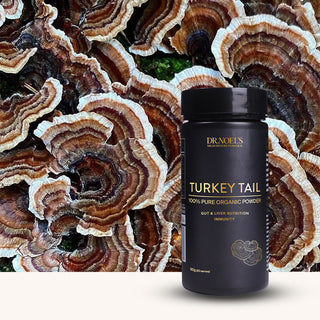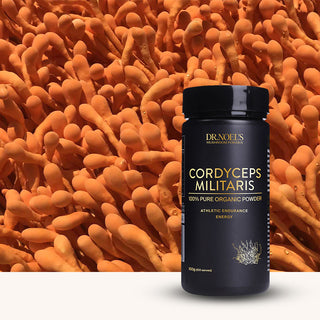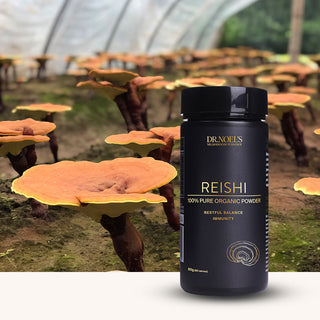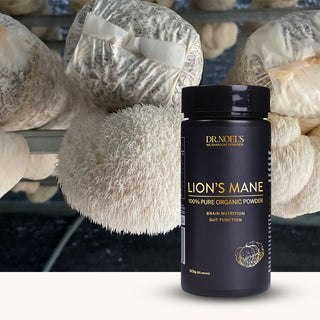Maintaining healthy lungs has become more difficult due to rising pollution levels and unhealthy lifestyle choices, despite lung health being essential for overall well-being. As per the World Health Organization (WHO), chronic respiratory diseases account for 4.0 million deaths worldwide and have a prevalence of 454.6 million cases, making them the third most common cause of death.
Given the sharp increase in chronic lung disease cases in recent years, it is critical to monitor lung health. Even though inherited asthma or pollution exposure may not be preventable, taking natural supplements can support lung function and promote a robust immune system.
The use of cordyceps mushrooms is growing in popularity as more people search for natural lung health supplements. Although many supplements are available for respiratory support, Cordyceps has several advantageous bioactive compounds that offer many health benefits, including support for lung health.
Cordyceps mushroom could help keep the airways open, facilitating easy and unrestricted breathing. They might work well as supplements for respiratory conditions like shortness of breath.
This post explores the benefits of Cordyceps for lung health.

Unveiling The Science Behind The Cordyceps Benefits On Lung Health
Cordyceps have long been used in traditional Eastern medicine due to their purported ability to improve lung function and immunity to respiratory infections. These traditional applications of Cordyceps for the lungs are supported by recent scientific research.
Cordyceps may have anti-inflammatory and antioxidant effects in diseases like chronic bronchitis and chronic obstructive pulmonary disease (COPD), which affect the lung tissues and cause chronic inflammation and damage. Cordyceps may be able to reduce inflammation and oxidative damage, which could help those suffering from these chronic lung conditions feel better and breathe easier.
According to scientific studies, Cordyceps may improve respiratory health by boosting the ability of the immune system to fight respiratory infections, lowering the symptoms of respiratory disorders, and increasing oxygen consumption. Those who suffer from chronic lung diseases like COPD and asthma may find these benefits helpful.
In addition, studies have shown that Cordyceps has anti-tumor effects on the lungs. The mushroom extract has been shown to induce spontaneous death of lung cancer cells, slow down their growth, and prevent their spread.
Research into the effects of Cordyceps on lung health has provided some intriguing insights, such as the following:
Cordyceps improves COPD
Cordyceps sinensis is a complementary medicine used to help treat Chronic Obstructive Pulmonary Disease (COPD). This is a condition where breathing becomes difficult or uncomfortable due to constriction of the airways.
Numerous randomized controlled trials have been carried out to assess the impact of CS on stable COPD, either by itself or in conjunction with other herbs. There were 1,238 participants in 15 interventional studies that were included in this review study.
According to a meta-analysis, there may be benefits to lung function, exercise endurance, quality of life, and symptom relief from both CS preparations and CS formulae. There were no documented severe side effects. Thus, CS seems like a promising course of treatment for people with stable COPD.
Cordyceps helps remodel the airways
A 2018 study was conducted to ascertain the impact of Cordyceps sinensis on airway remodeling in chronic obstructive pulmonary disease and explore the underlying molecular mechanisms,
For a duration of 12 weeks, rats with COPD were given oral administrations of Cordyceps sinensis at varying dosages. Evaluations were made of lung inflammation, airway remodeling, and the morphology of the biopsied airway tissue.
Treatment with the mushroom significantly reduced smooth muscle enlargement, epithelial thickening, and thickening of the airway walls in the rats with COPD.
Furthermore, giving the mushroom to rats with COPD decreased the production of inflammatory cytokines and the accumulation of inflammatory cells.
In the meantime, the COPD group’s elevated levels of collagen I and α-smooth muscle actin were significantly reduced by Cordyceps sinensis treatment. Additionally, Cordyceps sinensis decreased the expression level of multiple proteins and their receptors in comparison to rats with COPD who were not given any treatment. These findings suggested that Cordyceps sinensis therapy might be a helpful treatment strategy for COPD.
Cordyceps inhibits lung cancer growth
According to a 2015 study, Cordyceps militaris fruiting bodies inhibit the growth of lung cancer cells. This study aimed to learn more about the impact of Cordyceps militaris methanolic extract on lung cancer cells and how it inhibits tumor growth. According to the results, the extract treatment led to increased apoptosis, cell cycle arrest, and decreased cellular proliferation. Furthermore, following treatment, the extract elevated the markers of DNA damage.
Cordyceps has anti-tumor effects on the lungs
A 2021 study found that Cordyceps acid lowers lung cancer in nude mice. A detailed record of the tumor growth in the mice was kept. Apoptosis, or spontaneous cell death, was found in the tumor tissues of the nude mice. The findings demonstrated that cordyceps acid prevented lung cancer by controlling multiple signals. In conclusion, cordyceps acid inhibits tumor growth in lung cancer by regulating signaling pathways.
Cordyceps militaris exerts an anti-cancer effect on lung cancer by inhibiting signaling, according to the findings of a 2020 study. The study aimed to identify the underlying mechanisms and examine the impact of an extract from Cordyceps militaris on the growth and death of lung cancer cells. Using lung cancer cells treated with Cordyceps militaris, researchers conducted an assay to detect cell proliferation, looked for morphological changes, and used specialized techniques to measure the protein expression of apoptosis and signaling-related proteins.
First, researchers discovered that Cordyceps militaris caused morphological disruption and decreased cancer cell viability. Additionally, they verified that C militaris inhibited the signaling pathway. Specialized techniques revealed that Cordyceps militaris caused the cancer cells to undergo apoptosis. They also showed that the mushroom impacts the apoptotic pathway.
These results suggested that Cordyceps militaris induced death of the lung cancer cells. Combined, these results offer fresh perspectives on the use of Cordyceps militaris in treating lung cancer.
Researchers examined the antitumor effect of Cordyceps militaris extract on chemotherapy-resistant lung cancer cells in another 2019 paper that was published in the Journal of Medicinal Food. The extract of Cordyceps militaris inhibited the growth of cancer cells. The extract from the mushrooms caused the cells to undergo apoptosis. The cell cycle arrest was seen in the cells to which the mushroom treatment was applied. These findings showed that extract from Cordyceps militaris is an alternative strategy to treating cancer.
Cordyceps induces death of lung cancer cell
Cordyceps militaris induces cell apoptosis, inhibits cell proliferation, and causes cell cycle arrest in human lung cancer cells, according to a study published in OncoTargets and Therapy.
The impact of Cordyceps militaris on tumor cell viability, cell apoptosis, and cell-cycle distribution was evaluated using a variety of assays.
After exposure to Cordyceps militaris, lung cancer cells displayed reduced cell viability. Moreover, the mushroom caused concentration-dependent apoptosis in cancer cells.
The effects of Cordyceps militaris on the cell cycle were further supported by the downregulation of cell cycle regulatory proteins in cancer cells.
This study provided evidence for an alternate therapeutic approach for the treatment of lung cancer by demonstrating the inhibitory effect of Cordyceps militaris on cell proliferation as well as its facilitative role in cell apoptosis and cell cycle.
Cordyceps slows down lung cancer growth
A Chinese study looked into Cordyceps militaris (CM) and its possible defense against lung cancer in mice. To assess their impact on lung cancer, the tumor weight, tumor volume, and tumor inhibition rate in mice in the chemotherapy (cisplatin) or Cordyceps (low-, medium-, and high-dose) and Cordyceps militaris (low-, medium-, and high-dose) groups were compared.
The pharmacodynamic data showed that the mice in the cisplatin group and the high-dose Cordyceps militaris group had tumors with lower weight and volume.
Researchers concluded that Cordyceps militaris may considerably slow down the growth of lung cancer tumors in mice. The findings would provide a basis for the clinical application of mushrooms in anti-cancer research.
Cordyceps prevents lung cancer spread
According to research from The People’s Republic of China, the invasion and spread (metastasis) of lung cancer cells are inhibited by Cordyceps militaris fraction.
This 2018 study looked into the anti-metastasis and anti-invasion properties of the Cordyceps militaris fraction in lung cancer cells, which have a high potential for metastasis. It was established that the Cordyceps militaris fraction inhibited the ability of lung cancer cells to survive.
According to the outcomes of in vitro tests for cell adhesion, wound healing, migration, and invasion, cancer cells treated with Cordyceps militaris fraction showed a concentration-dependent decrease in cell migration and invasion compared to the control.
Cordyceps can provide relief for asthma
Chronic inflammatory asthma is characterized by mucus overproduction, airway inflammation, hyperresponsiveness, and airflow obstruction. A 2020 study indicated that Cordyceps polysaccharide reduces airway inflammation in asthmatic mice. The study was published in the Journal of Respiratory Physiology & neurobiology.
In the study, researchers assessed the possible regulatory impact of different dosages of Cordyceps polysaccharide on mice with asthma.
The findings demonstrated that the administration of Cordyceps polysaccharide to asthmatic mice inhibited the release of inflammatory markers implicated in the onset of asthma in both the bronchoalveolar lavage fluid (BALF) and blood. Additionally, the mushroom lowered blood levels of IgE, an antibody that is frequently elevated in allergies and asthma. This was contrasted with the mice that received no mushroom treatment.
Additionally, cordyceps polysaccharide reduced the number of cells generating mucus, the infiltration of inflammatory cells, and the number of inflammatory cells in the mice. These results suggested that the polysaccharide found in Cordyceps might be a useful medicinal tool for treating allergic asthma.
According to a 2023 study, the polysaccharide found in Cordyceps militaris reduces allergic asthma symptoms and balances the gut microbiota. In mice with allergic asthma, cordyceps militaris polysaccharide reduced the number of inflammatory cytokines, diminished lung histopathological alterations, controlled the expression of proteins involved in oxidative stress and inflammatory pathways, and enhanced microbiota function.
Furthermore, it was discovered that there was a significant correlation between some intestinal microbial communities and the amounts of inflammatory cytokines in mouse lung tissue. By controlling signaling pathways, Cordyceps militaris polysaccharide reduced oxidative stress and the inflammatory response in allergic asthma mice. This may have a direct bearing on preserving the stability of the gut microbiota.
Cordyceps increases the quality of life in asthma
Patients who have moderate-to-severe asthma experience a significant reduction in their health-related quality of life. According to a study published in the journal “Evidence-based Complementary and Alternative Medicine”, Cordyceps sinensis improves the quality of life associated with health in people with moderate-to-severe asthma.
One hundred twenty participants were randomly assigned to receive Corbin capsules containing Cordyceps sinensis for three months, while the control group did not receive treatment with Corbin capsules to examine the effects of Cordyceps sinensis on patients with moderate-to-severe persistent asthma. Anti-asthmatic drugs were inhaled and administered to both groups.
Evaluations were also conducted on the frequency of asthma flare-ups, pulmonary function tests, and blood levels of inflammatory mediators. Comparing the treatment group to the control group, the results revealed a significant increase in lung function and quality of life scores. Comparing the treatment group to the control group, there was a decrease in the expression levels of inflammation markers in the blood.
Consequently, it was determined that a formulation of Cordyceps sinensis enhanced the patients’ inflammatory profile, lung function, quality of life, and asthma symptoms in those with moderate-to-severe asthma.
Cordyceps helps protect against altitude sickness
One of the most prevalent altitude illnesses, acute mountain sickness, damages the brain and lungs. An investigation into the anti-hypoxic properties of pure polysaccharides obtained from Cordyceps militaris was conducted in 2015.
Several tests were conducted to determine the anti-hypoxic effects of the purified aqueous extract of Cordyceps militaris. Overall, it was found that the polysaccharide Cordyceps militaris, or CMN1, was a helpful agent against hypoxia.
Cordyceps has a protective role in acute lung injury
The protective effect of Cordyceps sinensis extract against acute lung injury in mice was assessed in a 2019 study. The mice were given different doses of the mushroom extract. Wet/dry lung weight ratio and histopathological analysis were performed. Bronchoalveolar lavage fluid was obtained to measure protein levels, inflammation and injury markers, and cell count.
The result demonstrated that the mushroom extract could, in a dose-dependent manner, lower the wet/dry weight ratio and the degree of histopathological damage. Using the mushroom extract significantly reduced the fluid’s increased total cell count. The extract from Cordyceps sinensis significantly lowered the injury and inflammatory markers levels.
To sum up, the mushroom may have anti-oxidant and anti-inflammatory properties for acute lung injury. The outcome demonstrated the potential protective effect of Cordyceps sinensis extract against acute lung injury.
A 2023 study looked into Cordyceps sinensis’ ability to prevent acute lung injury brought on by acute kidney injury. Forty-eight male Sprague-Dawley rats were split into 4 groups, some receiving saline and others receiving mushrooms. The lung’s wet-to-dry ratio, blood urea nitrogen, creatinine, inflammatory proteins, and oxidative stress biomarkers like myeloperoxidase (MPO), superoxide dismutase (MDA), and malonaldehyde (MDA) were measured. Histological analyses were performed to assess lung and kidney tissue damage. The researchers also measured the expressions of the proteins.
The groups that were given the mushroom showed a decrease in both the blood levels of the compounds mentioned above and the wet-to-dry ratio of their lungs. According to the results, Cordyceps sinensis may be able to treat lung damage that follows renal injury.
Cordyceps can help alleviate silicosis and its complications
Silicosis is an occupational lung disease caused by breathing in free silica dust. It is characterized by chronic lung inflammation, which leads to lung fibrosis and eventual failure. Because of the disease’s complex pathogenesis, there hasn’t been an effective treatment for it until now. The tonifying effects of fermented cordyceps powder on the kidney and lungs are comparable to those of natural cordyceps. It is now being utilized as an adjuvant for silicosis. The aim of this 2023 study was to confirm the powdered fermented cordyceps’ ability to prevent silicosis and investigate the underlying mechanism.
Wistar rats were randomly divided into four groups, and some were given the mushroom. The powdered fermented cordyceps were given to specific groups of rats every day. Samples were taken on days 7, 28, and 56 of treatment to conduct additional analysis.
The number of inflammatory proteins present and the infiltration of inflammatory cells decreased using fermented Cordyceps. Using the mushroom could reduce the inflammation and lung fibrosis caused by silica.
Cordyceps may be effective in tuberculosis
According to a 2017 study, Cordyceps sinensis improves bacteriostatic activity in Mycobacterium tuberculosis disease and supports immune regulation. The purpose of this study was to look into how Cordyceps sinensis affected mice that were infected with Mycobacterium tuberculosis. Four groups of mice were randomly assigned; some groups received an anti-tubercular drug or the mushroom.
Following the administration of the anti-tubercular medication, the mice’s lungs were removed, and the number of bacterial colonies was measured to confirm the impact of Cordyceps sinensis and the anti-tubercular medication on Mycobacterium tuberculosis.
Analysis was done on the protein expression levels in the lungs of mice. According to the results, the anti-tubercular medication plus Cordyceps sinensis combination produced the lowest bacterial colony count among the treated groups.
Moreover, the treatment suppressed the secretion of inflammatory proteins and cells in the blood. In mice, the drug plus the mushroom combination produced better bacteriostatic and immunomodulatory effects than the drug alone. To sum up, Cordyceps sinensis is a valuable adjuvant in treating tuberculosis.
Cordyceps may help combat COVID-19
The 2019 coronavirus disease (COVID-19) is caused by a SARS-CoV-2 retroviral infection. It is a significant concern and a global health emergency due to its virulence and high infection rate. It has been demonstrated that the COVID-19 vaccinations currently on the market that have been approved by regulatory agencies worldwide offer considerable protection against the virus. However, no vaccination can completely guard against infection.
Studies have revealed that cordyceps mushrooms possess several medicinal qualities that may help fight SARS-CoV-2, such as enhanced lung function, antiviral, anti-infectious, anti-inflammatory, and immunomodulatory effects.
The objective of this 2023 study was to screen for and assess the bioactive compounds from the Cordyceps species’ ability to inhibit SARS-CoV-2.
Cordycepic acid was the most efficient and promising candidate of all the molecules tested. These results must be explored through in vitro and in vivo studies for additional validation.
Cordyceps may protect against the flu
A fatty acid produced from Cordyceps may potentially be utilized as an anti-inflammatory treatment for influenza virus infections, according to the findings of a 2021 study. Here, the scientists created a novel fatty acid through chemical synthesis, which reduced proinflammatory reactions. They also noticed that the mushroom compound had anti-inflammatory properties.
Cordyceps has anti-inflammatory effects on asthma and rhinitis
Asthma and allergic rhinitis are common chronic respiratory allergies. Cordyceps is one of the most well-known herbal treatments for respiratory conditions like asthma and lung inflammation.
In a study done on mice with allergic rhinitis, researchers showed the antiallergic rhinitis effect of Cs-4, a water extract made from the mycelium culture of Cordyceps sinensis. Additionally, the anti-asthmatic effect of Cs-4 in asthmatic rats was assessed.
The mice’s nasal symptoms were reduced when they received Cs-4 treatment. Rats treated with Cs-4 also showed improvements in their scratching behavior and a decrease in airway responsiveness. In rat lung tissue, the increases in inflammatory protein levels were entirely inhibited by Cs-4 treatment. The findings point to the possibility that Cs-4 could reduce immunological hypersensitivity reactions in cases of asthma and allergic rhinitis.
Benefits Of Cordyceps
Cordyceps is thought to provide several additional health benefits in addition to their potential benefits for lung health. These fungi have been used for centuries in traditional medical systems because of their reputation for boosting immunity, promoting longevity, and restoring energy to the body.
Here are some proven benefits of Cordyceps, in addition to its health-boosting effects on the lungs.
Strengthens the immune system.
According to research, Cordyceps may strengthen the immune system and regulate immunological responses by inducing pro-inflammatory cytokines released by immune cells.
Possesses possible anti-tumor properties.
According to promising research, Cordyceps may be able to inhibit the growth of numerous cancer cell types, including those that cause skin, liver, colon, and lung cancers. It may also be able to prevent cancer altogether.
Furthermore, Cordyceps may help alleviate some of the side effects of cancer treatment, most notably leukopenia, a condition in which the body’s white blood cell counts plummet and become more vulnerable to infection.
Supports heart health.
Exciting new research shows that Cordyceps can protect the heart and lower cholesterol because they contain adenosine, a natural substance with heart-protective properties.
The use of Cordyceps to treat arrhythmias—heart rates that are abnormally fast, slow, or irregular—has already received approval in China.
Helps rejuvenate.
This powerful fungus can support your body’s ability to recover and rest. Cordyceps has been demonstrated to improve cellular rejuvenation, which means it can help you sleep better and have more energy throughout the day. Additionally, Cordyceps has been shown to support healthy aging, liver and kidney function, libido, energy and performance, inflammation, and blood sugar regulation.
Increases testosterone levels.
It has been demonstrated that Cordyceps improves testosterone levels while also boosting sperm motility, count, and even sexual performance.
As with everything, quality matters and only a high-quality Cordyceps mushroom supplement can help reap all the health-boosting benefits. Here are some essential things to look for.
FAQs About Cordyceps For Lungs
Is It Safe To Take Cordyceps Mushrooms Every Day?
Although there are a few known side effects, Cordyceps mushrooms are generally thought to be safe for most people when taken as part of a balanced diet. Only rarely have users of Cordyceps mushrooms reported experiencing nausea, upset stomach, or allergic reactions.
What Is The Recommended Dosage Of Cordyceps For Lung Health?
Because Cordyceps is a natural substance, there are no set dosage recommendations for the amount of Cordyceps or supplements to take. Based on scientific literature, the recommended daily dosage for powdered Cordyceps extract is one to three grams. As a general rule, we advise reading product labels to determine their guidelines.
Does Cordyceps Increase Oxygen Levels?
Cordyceps can increase the amount of oxygen in the blood. The blood’s ability to absorb more oxygen can increase oxygen capacity, which can enhance muscular function and endurance. During high-intensity physical exercise, Cordyceps enhances oxygen uptake and transportation.
How Fast Does Cordyceps Work For The Lung?
Many factors, such as an individual’s overall health, lifestyle, the severity of their lung condition, and the dosage and quality of the Cordyceps supplements they use, can affect how long it takes to start feeling the benefits of taking Cordyceps for lung health. While more targeted benefits like better respiratory function or relief from symptoms of chronic lung conditions may require several months of consistent use, some people may experience slight improvements in energy levels and general well-being within a few weeks of regular Cordyceps consumption.
Conclusion
The antioxidant, anti-inflammatory, and immunomodulatory qualities of Cordyceps are thought to have potential benefits for lung health. Studies have indicated that they may be helpful in the treatment of lung tumors, acute lung injury, chronic bronchitis, asthma, and chronic obstructive pulmonary disease. They may also improve lung function, lower inflammation, and prevent the growth and spread of cancer cells.
References
1. WHO. Chronic obstructive pulmonary disease (COPD)
2. Evidence-based complementary and alternative medicine : eCAM. Effectiveness and Safety of Oral Cordyceps sinensis on Stable COPD of GOLD Stages 2-3: Systematic Review and Meta-Analysis.
3. Experimental and therapeutic medicine. Cordyceps sinensis inhibits airway remodeling in rats with chronic obstructive pulmonary disease.
4. Molecules (Basel, Switzerland). Cordyceps militaris (L.) Link Fruiting Body Reduces the Growth of a Non-Small Cell Lung Cancer Cell Line by Increasing Cellular Levels of p53 and p21.
5. Journal of biochemical and molecular toxicology. Cordyceps acid alleviates lung cancer in nude mice.
6. Integrative cancer therapies. Cordyceps militaris Exerts Anticancer Effect on Non-Small Cell Lung Cancer by Inhibiting Hedgehog Signaling via Suppression of TCTN3.
7. Journal of medicinal food. The Extract of Cordyceps Militaris Inhibited the Proliferation of Cisplatin-Resistant A549 Lung Cancer Cells by Downregulation of H-Ras.
8. OncoTargets and therapy. Se-Enriched Cordyceps militaris Inhibits Cell Proliferation, Induces Cell Apoptosis, And Causes G2/M Phase Arrest In Human Non-Small Cell Lung Cancer Cells.
9. China journal of Chinese materia medica. Mechanism of Cordyceps militaris against non-small cell lung cancer: based on serum metabolomics.
10. Oncology letters. Cordyceps militaris fraction inhibits the invasion and metastasis of lung cancer cells through the protein kinase B/glycogen synthase kinase 3β/β-catenin signaling pathway.
11. Respiratory physiology & neurobiology . Cordyceps polysaccharide ameliorates airway inflammation in an ovalbumin-induced mouse model of asthma via TGF-β1/Smad signaling pathway.
12. International journal of biological macromolecules. Cordyceps militaris polysaccharide alleviates ovalbumin-induced allergic asthma through the Nrf2/HO-1 and NF-κB signaling pathways and regulates the gut microbiota.
13. Evidence-based complementary and alternative medicine : eCAM. Herbal Medicine Cordyceps sinensis Improves Health-Related Quality of Life in Moderate-to-Severe Asthma.
14. Molecular medicine reports. Purification of polysaccharides from Cordyceps militaris and their anti‑hypoxic effect.
15. Bioscience reports. Protective effect of Cordyceps sinensis extract on lipopolysaccharide-induced acute lung injury in mice.
16. Chinese journal of integrative medicine. Protective Mechanism of Cordyceps sinensis Treatment on Acute Kidney Injury-Induced Acute Lung Injury through AMPK/mTOR Signaling Pathway.
17. Chinese medicine. Fermented cordyceps powder alleviates silica-induced pulmonary inflammation and fibrosis in rats by regulating the Th immune response.
18. Brazilian journal of medical and biological research. Cordyceps sinensis promotes immune regulation and enhances bacteriostatic activity of PA-824 via IL-10 in Mycobacterium tuberculosis disease.
19. Journal of biomolecular structure & dynamics. In silico screening of potential inhibitors from Cordyceps species against SARS-CoV-2 main protease.
20. ACS omega. Novel Fatty Acid in Cordyceps Suppresses Influenza A (H1N1) Virus-Induced
21. Proinflammatory Response Through Regulating Innate Signaling Pathways.
22. Molecules (Basel, Switzerland). Anti-Inflammatory Effects of a Cordyceps sinensis Mycelium Culture Extract (Cs-4) on Rodent Models of Allergic Rhinitis and Asthma.





